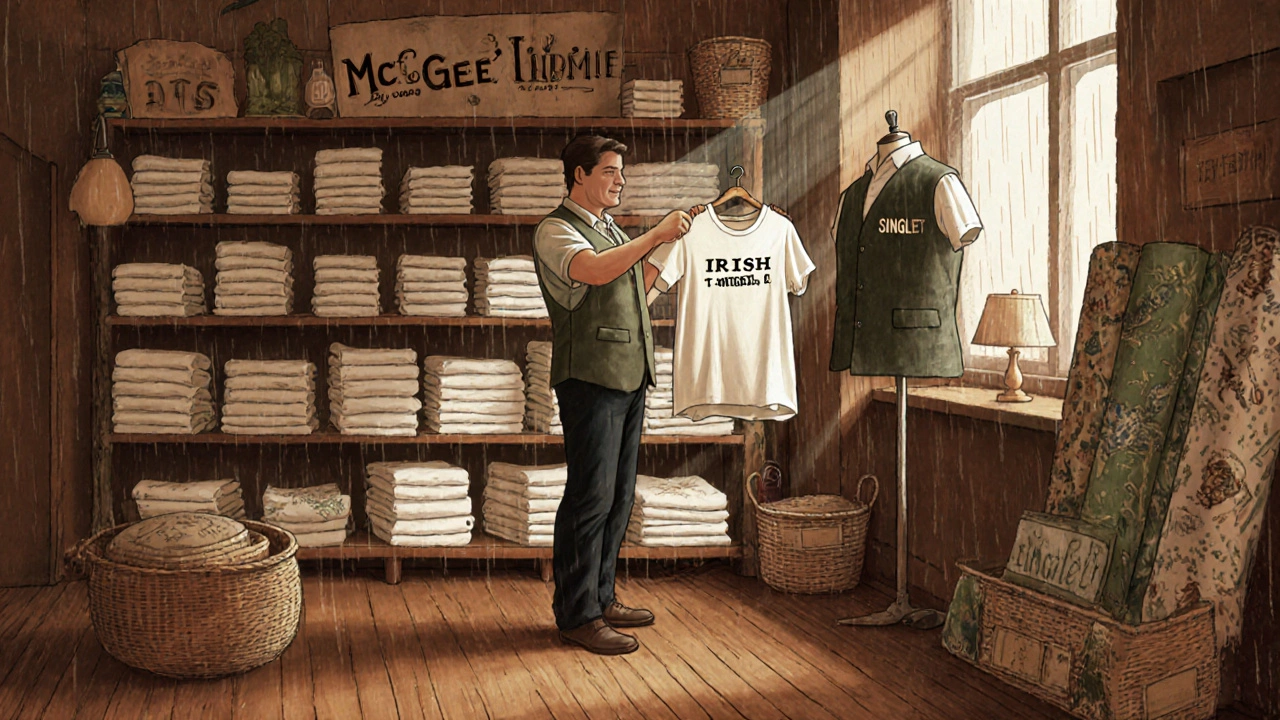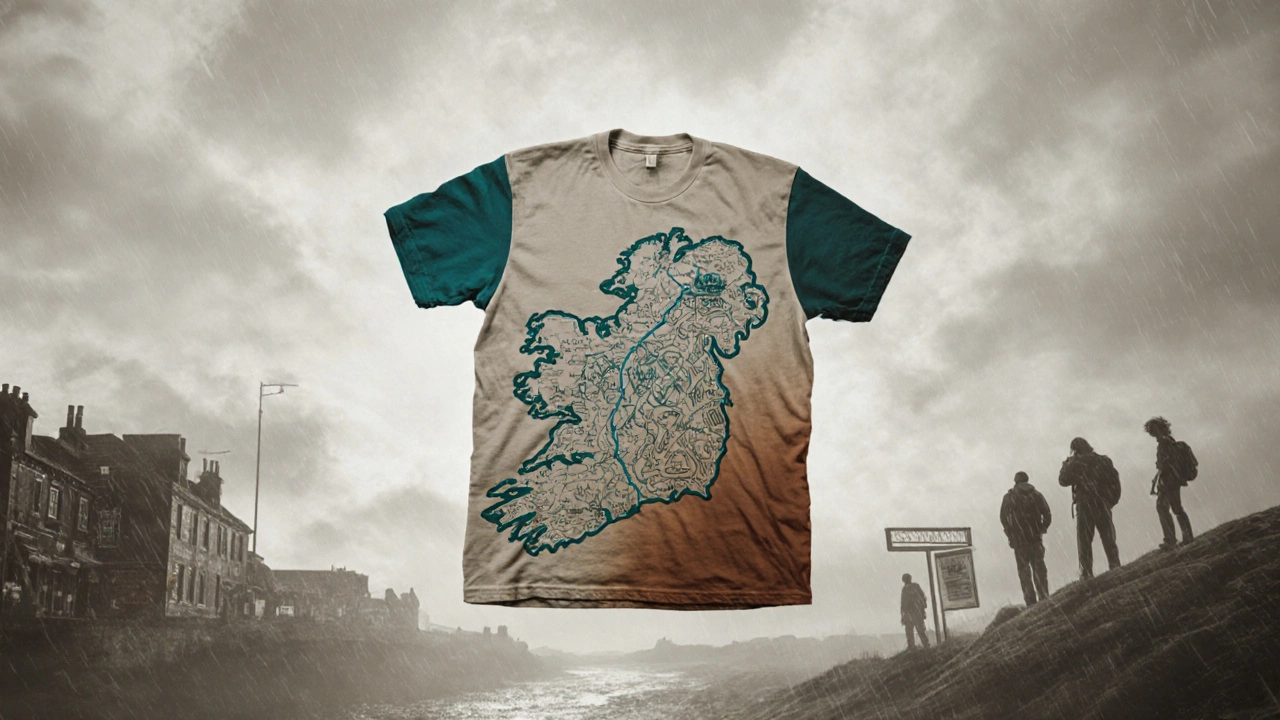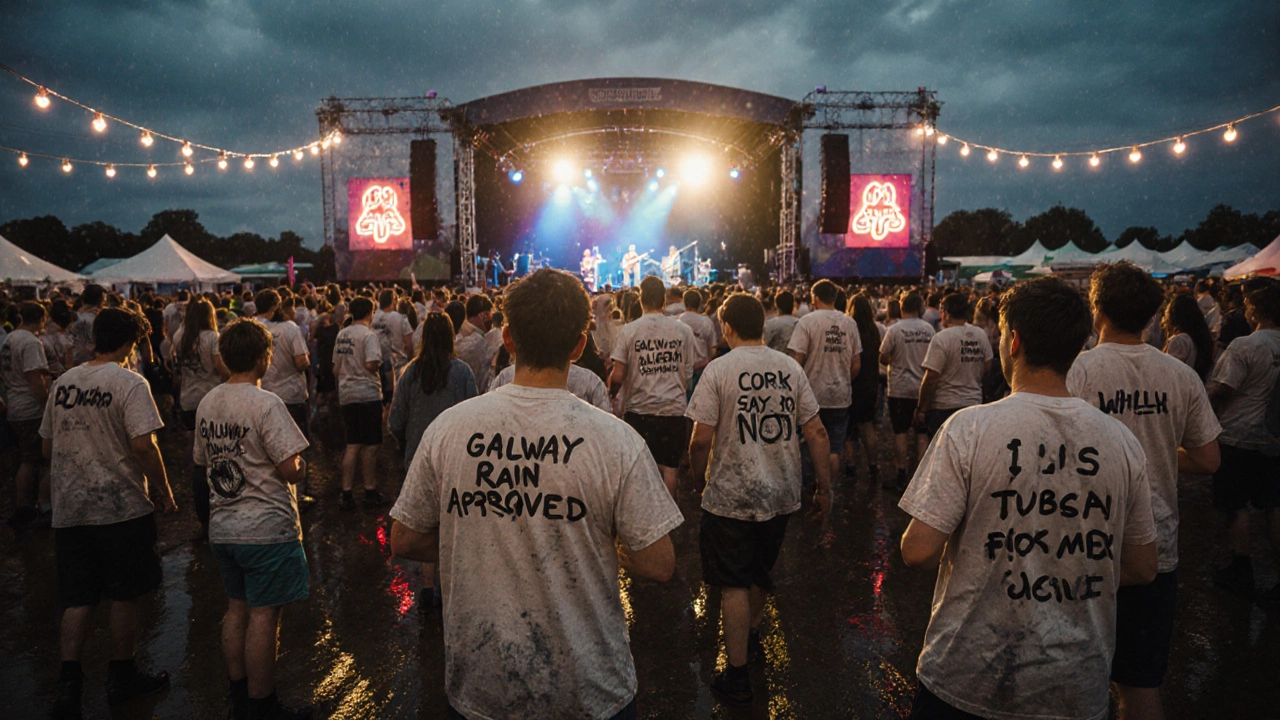Irish vs British T-Shirt Terminology Quiz
Question 1
In Ireland, what do we call a sleeveless cotton top?
Question 2
What do Brits typically call the short-sleeved cotton top we call a 't-shirt' in Ireland?
Question 3
In Ireland, what does 'vest' refer to?
Question 4
Which of these is a characteristic of Irish t-shirt fit?
Question 5
What is the best way to identify authentic Irish t-shirts?
In Ireland, the humble t-shirt isn’t just clothing-it’s a weather-resistant layer, a festival uniform, and sometimes, the only thing between you and a sudden downpour in Galway. But if you’ve ever overheard someone in Cork or Derry say they’re wearing a ‘vest,’ you might’ve paused. Are they getting ready for the gym? Or just trying to stay cool in a pub? The truth is, what Brits call a t-shirt isn’t always what we call it here-and it’s not always the same across the UK either.
What’s in a Name? The Irish and British T-Shirt Puzzle
If you walk into a supermarket in Belfast, you’ll likely find plain cotton tees labeled as ‘t-shirts’-just like in Dublin, Limerick, or Waterford. But ask a local in Manchester or Leeds what they call a sleeveless cotton top, and they’ll say ‘vest.’ In Ireland, that same item? It’s a ‘singlet.’ And if you show up to a Donegal farmers’ market wearing a sleeveless cotton top and call it a ‘vest,’ you’ll get a confused look. Here, a vest means something else entirely: a woolen or fleece waistcoat you’d wear under a jacket on a blustery April day in Clifden.
So when Brits say ‘t-shirt,’ they mean what most of Ireland does too: a short-sleeved, cotton, round-neck top. But when they say ‘vest,’ they’re talking about what we call a ‘singlet.’ And here’s where it gets messy: in Ireland, a ‘singlet’ is almost always sleeveless. In parts of the UK, especially the North, ‘vest’ can mean either a sleeveless top or a thermal undershirt. That’s why a Dubliner buying a pack of ‘vests’ at Dunnes Stores expects sleeveless cotton tops-not thermal layers.
Why Does This Matter in Ireland?
It matters because Ireland’s climate doesn’t care about semantics. A damp August evening in Wexford doesn’t wait for you to sort out whether your top is a ‘t-shirt’ or a ‘vest.’ You just need something breathable, quick-drying, and cheap. That’s why the most common t-shirts sold here aren’t branded with global logos-they’re plain, 100% cotton, bought in bulk from local suppliers like Irish T-Shirt Co. in Limerick or McGee’s Dry Goods in Sligo. These aren’t fashion pieces. They’re workwear, festival gear, and laundry-day staples.
Look at the Irish music festival scene. At Electric Picnic in County Laois, you’ll see thousands of people wearing the same thing: a faded, oversized cotton tee, often from a local band or pub. You won’t find many people in designer tees. Instead, you’ll see ones with hand-painted slogans like ‘Cork Says No’ or ‘Galway Rain Approved.’ These aren’t bought online-they’re printed at small shops in Temple Bar or on the edge of the Liffey in Dublin 8. The t-shirt here isn’t a status symbol. It’s a badge of belonging.

The Irish T-Shirt: More Than Just Fabric
The Irish t-shirt has evolved beyond the basic cotton tee. It’s become a canvas for local identity. Brands like Claddagh & Co. in Galway sell tees with subtle Celtic knotwork-not the kind you’d find on a tourist souvenir shop. These are designed by local artists, printed with water-based inks, and sold in independent boutiques in Kilkenny or Doolin. You won’t find them in SuperValu.
And then there’s the ‘Irish weather tee’-a cultural phenomenon. These are the ones with slogans like ‘I Survived the Wind in Mayo’ or ‘Dublin Rainproof Since 1997.’ They’re not just funny. They’re practical. People buy them because they’re true. In Ireland, weather isn’t just background noise-it’s a daily conversation starter. And what you wear? It’s part of that dialogue.
Shopping for T-Shirts in Ireland: What to Look For
If you’re buying t-shirts in Ireland, here’s what you need to know:
- Material matters: Skip polyester blends. Look for 100% cotton, preferably ring-spun. It’s softer, lasts longer, and doesn’t cling when it rains.
- Fit is relaxed: Irish t-shirts aren’t slim-fit. They’re meant to be worn over a thermal in winter or layered under a jacket. A little extra room is normal.
- Buy local: Support small Irish printers like Printed in Ireland in Cork or Donegal Tee Co. They use organic cotton and local dye houses.
- Avoid ‘UK brands’ with Irish tags: Many ‘Irish’ t-shirts sold online are actually made in Bangladesh and just stamped with a shamrock. Check the label. If it says ‘Made in China,’ it’s not really Irish.
And if you’re in a shop and someone says, ‘We’ve got a few vests left,’ ask: ‘Sleeveless?’ If they nod, you’re good. If they hand you a thermal undershirt, you’ve just learned the hard way how language shifts across borders.

What About the Rest of the UK?
It’s not just Ireland that’s confused. In Scotland, ‘singlet’ is rarely used. In Northern England, ‘vest’ can mean a sleeveless top or a long-sleeved thermal. In Wales, people might say ‘tee’ as shorthand. But in Ireland, we’ve carved out our own terms-and we use them with pride. A ‘t-shirt’ is a t-shirt. A ‘singlet’ is sleeveless. A ‘vest’ is wool. No mix-ups. No compromises.
This isn’t just about words. It’s about identity. When you wear a t-shirt printed with a line from Seamus Heaney or a map of the Wild Atlantic Way, you’re not just dressed-you’re connected. And that connection? It doesn’t come from a global brand. It comes from knowing what your neighbors call it, and why.
Final Thoughts: Language, Climate, and Culture
In Ireland, clothing isn’t just about fashion. It’s about surviving the wind, staying dry in the rain, and fitting in at a ceilidh in Kerry. The t-shirt, in all its forms, is a quiet hero. It doesn’t need to be flashy. It just needs to be there-when you’re hiking the Wicklow Way, when you’re waiting for the bus in Letterkenny, or when you’re standing in a pub after a night out in Galway.
So if someone asks you what Brits call t-shirts, you can answer: mostly the same thing we do. But if they ask what we call sleeveless cotton tops? You’ll know better than to say ‘vest.’ In Ireland, that’s a woolly waistcoat. And you don’t wear that to a music festival.
What do Irish people call a sleeveless cotton top?
In Ireland, a sleeveless cotton top is called a ‘singlet.’ This is different from the UK, where ‘vest’ is often used for the same item. In Ireland, a ‘vest’ refers to a wool or fleece waistcoat worn under a jacket, especially in cooler weather.
Is ‘t-shirt’ the same in Ireland and the UK?
Yes, ‘t-shirt’ is the standard term in both Ireland and the UK for a short-sleeved, cotton, round-neck top. The difference lies in what people call sleeveless versions: ‘singlet’ in Ireland, ‘vest’ in much of the UK.
Where should I buy authentic Irish t-shirts?
Look for local Irish brands like Claddagh & Co. in Galway, Printed in Ireland in Cork, or McGee’s Dry Goods in Sligo. These shops use organic cotton, local printing, and often feature designs by Irish artists. Avoid online sellers that label imported tees as ‘Irish’ just because they have a shamrock.
Why do Irish t-shirts tend to be looser in fit?
Irish t-shirts are designed for layering. Whether it’s worn over a thermal in winter or under a windproof jacket, a slightly looser fit allows for movement and comfort in unpredictable weather. It’s practical, not fashion-driven.
Are there any Irish t-shirt brands that are popular at festivals?
Yes. Brands like Irish T-Shirt Co. and Donegal Tee Co. are staples at festivals like Electric Picnic and Fleadh Cheoil. Their tees often feature local humor, Irish language phrases, or regional landmarks-like the Cliffs of Moher or the Giant’s Causeway-printed in simple, durable inks.
